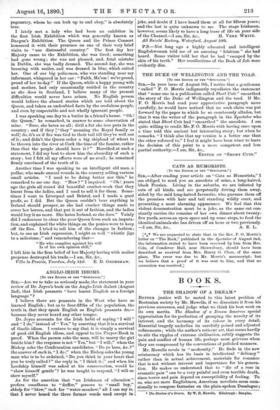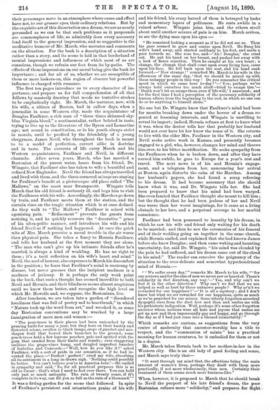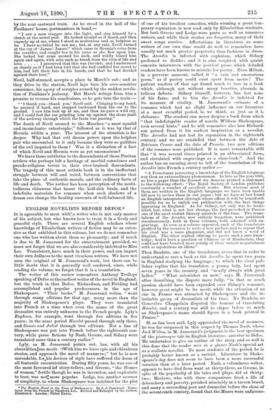BOOKS.
THE SHADOW OF A DREAM.*
BETTER justice will be meted to this latest problem of Bostonian society by Mr. Howells, if we dissociate it from his previous successes, and judge what we think his best work on its own merits. The Shadow of a Dream, deserves special appreciation for its perfection of grouping, the novelty of its interest, and the harmony of its colour in every detail. Essential tragedy underlies its carefully poised and adjusted refinements ; while the author's reticent art, that seems hardly to stir the ripples of extreme civilisation, subtly suggests the pain and conflict of human life, perhaps most grievous when they are compressed. by the conventions of polished manners.
Mr. Howells revels in " modernity." He finds in the new aristocracy which has its basis in intellectual " delicacy " rather than in actual achievement, materials for romance that is not without interest and importance for his genera- tion. He makes us understand that to " die of a rose in aromatic pain" can be a very painful and even terrible death, since terror and pain depend on susceptibility of feeling. To us, who are mere Englishmen, American novelists seem occa- sionally to compose fantasias on the plain-spoken Deealogae ; • The Shadow of a Dream. By W. D. Howells. Edinburgh : Douglas.
their personages move in an atmosphere where cause and effect have not, to our grosser eyes, their ordinary relations. But by the exquisite art of this dissertation on a dream, we are as nearly persuaded as we can be that such problems as it propounds are commonplaces of life, so admirably does every accessory lend itself to the general impression, and so suggestive is the meditative humour of Mr. March, who narrates and comments on the situation. For the book is a description of a situation rather than a story, and its scene is laid in that borderland of mental impressions and influences of which most of us are conscious, though we refrain our feet from its by-paths. The effects of those impressions on our moral being give the book its importance ; and for all of us, whether we are susceptible of them or mere lookers-on, this region of obscure but powerful influence is charged with romance.
The first ten pages introduce us to every character of im- portance, and prepare us for full comprehension of all that follows by masterly drawing that needs no tentative strokes 'to be emphatically right. Mr. March, the narrator, now, with his wife, a citizen of Boston, had in callow days, when a journalist in some Western city, made the acquaintance of Douglas Faulkner, a rich man of " three times skimmed sky- blue Virginia blood," a sentimentalist, rather belated in taste, trying to live up to the literature of the Byron and Lamartine age; not sound in constitution, or in his youth always strict in morals, until he profited by the friendship of a young clergyman, James Nevil, who throughout the book is meant to be a model of perfection, correct alike in doctrine and in taste. The currents of life carry March and his Western acquaintances, Faulkner and Nevil, in different channels. After seven years, March, who has married a Bostonian of the purest water, hears from his friend, Dr. Wingate, that Faulkner also has taken to wife a beautiful and refined New Englander. Nevil the friend has always travelled and lived with them, and the three-cornered menage are staying for Faulkner's benefit at a picturesque old place called " The Mallows," on the coast near Swampscott. Wingate tells March that his old friend is seriously ill, and begs him to visit the Faulkners with his wife. Accordingly, the Marches go down by train, and Faulkner meets them at the station, and the curtain rises on the tragic situation which is at once defined. As they walk to " The Mallows" Faulkner is seized with agonising pain. " Refinement " prevents the guests from noticing it, and he quickly recovers the " decorative " grace of his ultra-polite manner, and introduces his wife and his friend Nevil as if nothing had happened. At once the quick wits of Mrs. March perceive a moral trouble in the ,air worse than physical pain. She takes a fancy to Hermia Faulkner, and tells her husband at the first moment they are alone. ." The man who can't give up his intimate friends after he's married, is always a kind of weakling. He has no right to them ; it's a tacit reflection on his wife's heart and mind." Nevil, the soul of honour, also expresses to March his discomfort in the position ; he fears that Faulkner's mind is unstrung by disease, but never guesses that the incipient madness is a madness of jealousy. It is perhaps the only weak point in the book, that such a thought has seemed incredible to both Nevil and Hermia, and their blindness seems almost suspicious until we know them better, and recognise the high level on -which Mr. Howells and, we suppose, the Bostonians, live.
After luncheon, we are taken into a garden of "disordered loveliness that was full of poetry sad to heartbreak," in which "Nature took up the word from art," and wrecked it, as some day Bostonian conventions may be wrecked by a large immigration of mere men and women :-
" The pear-trees in their places had been untouched by the pruning knife for many a year, but they bore on their knotty and distorted scions, swollen to black lumps, crops of gnarled and mis- shapen fruit that bowed their branches to the ground; some peach-trees held a few leprous peaches, pale and spotted with the gum that exuded from their limbs and trunks ; over staggering trellises the grape-vines hung, and dangled imperfect bunches of Isabellas and Concords.= Well, how do you like it P asked Faulkner, with a sort of pride in our sensation, as if he had in- vented the place.= Perfect ! perfect !' cried my wife, absorbing all its sentiment in a long in-drawn sigh. 'Nothing could possibly be better. You can't believe you're in America here.'—He smiled in sympathy and said, 'No, for all practical purposes this is as old as Caesar : that's what I used to feel over there. You can hold only just so much antiquity. The rain of twenty years, if it's complete in its way, can fill you as full as the ruin of a thousand.' " It was a fitting garden for the scene that followed. In. spite of Faulkner's petsistent and. ostentatious praise - of- his wife
and his friend, his crazy hatred of them is betrayed by looks and momentary lapses of politeness. He rests awhile in a rained arbour. Wingate joins him, and the others stroll about until another seizure of pain is on him. March arrives, to see the dying man open his eyes :— •
"He remained looking a moment as if he did not see us. Then his gaze seemed to grow and centre upon Nevil. He flung his wife's hand away, and started suddenly to his feet, and made a pace towards us. She rose too, and=Ah ! Douglas,' she cried out. He put his hand on her breast, and pushed her away with a look of fierce rejection. Then he caught at his own heart; a change, the change that shall come upon every living face, came upon his face. He fell back upon the seat, and his head sank forward.—' How strange ! ' remarked Mr. March to his wife in the afternoon of the same day, that we should be mixed up with these unhappy people in this way ! Do you remember the critical
mood in which we came here to-day ? Yes ; perhaps we've always held ourselves too much aloof—tried to escape ties.'— Death won't let us escape them even if life will,' I answered ; and for the first time I had a perception of the necessary solidarity of human affairs from the beginning to the end, in which no one can do or be anything to himself alone."
No one but Dr. Wingate knew that Faulkner's mind had been for months breaking down under the horror of a dream re- peated at lessening intervals, and Wingate is unwilling to reveal its import; indeed, Hermia refuses at first to know what it was, when the doctor tells her that probably her husband would not ever have let her know the tenor of it. She returns to live with the elder Mrs. Faulkner in the Western city, and Nevil seeks active work in Kansas, and presently becomes engaged to a girl, who, however, changes her mind and throws him over, to his bitter mortification. He seeks sympathy from the Faulkners when he is broken down, and after they have nursed him awhile, he goes to Europe for a year's rest and travel. The next news is of his and Hermia's engage- ment, and a telegram from her, announcing her arrival at Boston, again disturbs the calm of the Marches. Among her husband's papers, she had found a scrap referring to his dream. It had become necessary that she should know what it was, and Dr. Wingate tells her. She had been prepared to know that his mind had been warped. She even fancied that Faulkner thought she meant to kill him ; but the thought that he had been jealous of her and Nevil was worse than her worst imaginings, for it came as a living obstacle to her love, and a perpetual scourge to her morbid conscience.
Faulkner had been possessed to insanity by his dream, in which he saw his wife and friend only waiting for his death to be married ; and then he saw the ceremonies of his funeral and of their wedding going on together in the same church, while Hermia smiled, and explained that she had known James before she knew Douglas ; and then came waking and haunting uncertainty, for, said Dr. Wingate, "his mind was clouded by the pain he had suffered, and his dream came out of the cloud in his mind." The reader can conceive the poignancy of the situation to the over-delicate and somewhat hypochondriacal mind of Hermia :-
"' We suffer every day,' " remarks Mr. March to his wife, "'for our sorrows and for the sins of men we never saw or heard of. There's solidarity in that direction, any way.'—' Yes, and why can't we feel it in the other direction ? Why can't we feel that we are helped as well as hurt by those unknown people ? Why ar'n't we rewarded for our happiness ? It is all a mystery ; and I don't know but what we are rewarded for our happiness, quite as much as we're punished for our misery. Some utterly forgotten ancestral dyspeptic rises from the dust now and then and smites me with his prehistoric indigestion. Well, perhaps it's some other forgotten ancestor whose motions were all hale and joyous that makes me get up now and then impersonally gay and happy, and go through the day as if I had just come into a blessed immortality.."'
Which remarks are curious, as suggestions from the very centre of modernity that ancestor-worship has a title to respect, and the " communion of saints " has a practical meaning for human creatures, be it embodied for them or not in a dogma.
Mr. March takes Hermia back to her mother-in-law in the Western city. She is an old lady of good feeling and sense, and March says truly that— "It went through my mind that, the affections being the main interest of women's lives, perhaps they dealt with them more practically, if not more wholesomely, than men. Certainly their treatment of them seems much more business-like."
When, however, it is proposed to March that he should break to .Nevil the purport of his late friend's dream, the poor Bostonian refuses more " solidarity," and prepaares_ for. flight by the next eastward train. As he stood in the hall of the Faulkners' house, portmanteau in hand,— " I saw a man stagger into the light, and stay himself by a clutch at the newel post. He looked around as if dazed, and then vaguely up at me, where I stood as motionless and as helpless as he. I have no belief he saw me; bnt, at any rate, Nevil turned at the cry of 'James ! James !' which came in Hermia's voice from the corridor, and caught her in his arms as she flew upon him. She locked her arms around his neck, and wildly kissed him again and again, with sobs such as break from the ruin of life and
love I perceived that this was the end; and I understood as clearly as if I had been told that she had confided her secret to him, had left their fate in his hands, and that he had decided against their love."
Nevil, half-stunned, accepts a place in March's cab ; and as they drive to the station, Nevil lays bare his over-sensitive conscience, his agony of scruples roused by the sudden revela- tion of Faulkner's jealousy. But March wrings from him a promise to reverse his conclusions, as he gets into the train :=
" 'I thank you—thank you,' Nevil said. Clinging to my hand, he pressed it hard, and stepped backward from the car to the ground. I saw him look up at me, and then he gave a wild cry, and I could feel the car grinding him up against the stone jamb of the archway through which the train was passing."
The death of Nevil seemed to the Marches "a most squalid and inconclusive catastrophe," followed as it was by that of Hermia within a year. The interest of the situation is far deeper. Why had that evil dream power upon the helpless pair who succumbed to it only because they were so guiltless of the evil imputed to them ? Was it a divination of a fact of which Nevil and Hermia were as yet unconscious?
We leave these subtleties to the descendants of those Puritan settlers who perhaps left a heritage of morbid conscience and pseudo-religious terror to their over-brained descendants. The tragedy of this most artistic book is in the ineffectual struggle between will and weird, between conventions that take the place of authentic morals, and the ordinary facts of life and death. The author has keen perception of the multi- tudinous chimaeras that haunt the half-sick brain, and the indefinite materials for romance when such shadows of a dream can change the healthy currents of well-balanced life.




































 Previous page
Previous page